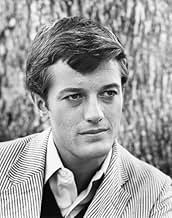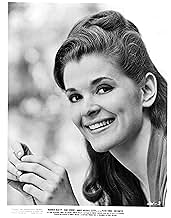ÉVALUATION IMDb
6,8/10
3,5 k
MA NOTE
Ajouter une intrigue dans votre langueA war veteran gets work at a mental institution, where he meets the beautiful and eccentric Lilith.A war veteran gets work at a mental institution, where he meets the beautiful and eccentric Lilith.A war veteran gets work at a mental institution, where he meets the beautiful and eccentric Lilith.
- Director
- Writers
- Stars
- Prix
- 2 nominations au total
Walter Arnold
- Lonely Girl's Father
- (uncredited)
Rene Auberjonois
- Howie
- (uncredited)
Elizabeth Bader
- Girl at Bar
- (uncredited)
Ruth Baker
- Patient
- (uncredited)
Janet Banzet
- Patient
- (uncredited)
Amelie Barleon
- Patient
- (uncredited)
Carson Barnes
- Child Crossing Street
- (uncredited)
Jeanne Barr
- Miss Glassman
- (uncredited)
David Barry
- Ambulance Attendant
- (uncredited)
Avis en vedette
Jean Seberg is absolutely captivating in this film. Yes despite the wig she wears, due to the fact her hair was cropped short for her previous films, she is as lovely as ever. One of my favorite films of all time and certainly the best one that deals with insanity in and honest and true way, not only avoiding the cliché' but completely reversing it and debunking the stereotype. Robert Rossen is a great director, one of history's most under-appreciated and few others could helm this story the way he does. Based on the novel by J.R. Salamanca, the story is of a young war vetern who returns home and seeks a job at the local mental institute. There he gets too involved with several of the patients and learns much about their past, which reflects the tragedy in his own life involving his mother.
It's true Warren Beatty does play the role blandly and stiff. While that's a turn off for many people watching the film, I think they fail to understand that just like Ryan O'Neil in Barry Lyndon, it's the character they're playing. Not the actor and certainly not the direction. Wonderful supporting cast from Kim Hunter and Peter Fonda as well as a brilliant cameo by Gene Hackman, which oozes of a marriage gone sour in his bit part.
It's a very hard film to figure out because so much is left untold and rightfully so leaving the audience to decide what happened. Playing on the fable of the past coming back to haunt us it plays deeply on buried memories and traumatic life experiences that were covered up rather than confronted. There is so much positive to say about this amazing film, but even so it's actress Jean Seberg that is the crown jewell in this picture. Criminally underseen, now that it is on DVD anyone interested in deep character studies should make it a point to watch this ASAP.
It's true Warren Beatty does play the role blandly and stiff. While that's a turn off for many people watching the film, I think they fail to understand that just like Ryan O'Neil in Barry Lyndon, it's the character they're playing. Not the actor and certainly not the direction. Wonderful supporting cast from Kim Hunter and Peter Fonda as well as a brilliant cameo by Gene Hackman, which oozes of a marriage gone sour in his bit part.
It's a very hard film to figure out because so much is left untold and rightfully so leaving the audience to decide what happened. Playing on the fable of the past coming back to haunt us it plays deeply on buried memories and traumatic life experiences that were covered up rather than confronted. There is so much positive to say about this amazing film, but even so it's actress Jean Seberg that is the crown jewell in this picture. Criminally underseen, now that it is on DVD anyone interested in deep character studies should make it a point to watch this ASAP.
The mental institution in this film, called "Poplar Lodge" I believe, is modeled on Chestnut Lodge, a Bethesda, Maryland institution famed for early attempts to establish interpersonal relationships with (rich) psychotic patients. This fits the institutional style depicted in this film. Hopwever, the main characters do not seem to be mentally ill so much as metaphores for the madness es in our society. The perception that sexual expression represents evil or crazy behavior, not changed all that much from the time this film was made, frequent wars, and the way sensitive people are brushed aside as others hustle toward dubious goals, are all personified as forms of madness. Okay so far.
But the film does not quite work. The character played by Anne Meacham, seething with barely suppressed sexuality, works, but Lilith, played as a golden haired all American, girl next door beauty, doing and saying odd things, making up her own language, seeing herself as an outside observer of our society, is a character which doesn't hit home. She seems more quirky than mad. That she drives men into destructive actions seems somehow unlikely. At the most, she may be a catalyst for their weaknesses to be expressed.
Jean Seberg doesn't personify madness. She seems just bemused. Warren Beatty conveys a lack of inner direction, a developing depression, and strange longings by looking blank, seeming inarticulate, and acting as if he has no idea of the direction his next step will take. All of this slows this film down to a very languid pace, frequently accompanied by a relaxed bop-along jazz score. Thus, the film is too slow, a long windup for a soft pitch. It is hard to feel much tension, even though it is clear that there is supposed to be a lot of tension. Nice try, but no cigar.
But the film does not quite work. The character played by Anne Meacham, seething with barely suppressed sexuality, works, but Lilith, played as a golden haired all American, girl next door beauty, doing and saying odd things, making up her own language, seeing herself as an outside observer of our society, is a character which doesn't hit home. She seems more quirky than mad. That she drives men into destructive actions seems somehow unlikely. At the most, she may be a catalyst for their weaknesses to be expressed.
Jean Seberg doesn't personify madness. She seems just bemused. Warren Beatty conveys a lack of inner direction, a developing depression, and strange longings by looking blank, seeming inarticulate, and acting as if he has no idea of the direction his next step will take. All of this slows this film down to a very languid pace, frequently accompanied by a relaxed bop-along jazz score. Thus, the film is too slow, a long windup for a soft pitch. It is hard to feel much tension, even though it is clear that there is supposed to be a lot of tension. Nice try, but no cigar.
This forgotten, totally under-appreciated film from 1964 is very powerful (I believe it was Robert Rossen's last film). Strangely hypnotic and frightening in a very subtle way, this showed Beatty three years before B&C showing the potential he had in Splendor in the Grass. He also met Gene Hackman while making this and later cast him as his brother in B&C which launched Hackman.
There is also a splendid performance from Peter Fonda, of all people. As Hackman's wife, Jessica Walter showed how amazing she was at a relatively young age and just never got the right parts in decent films. You'll also see a young Rene Auberjenois and Olympia Dukakis in a bit part. I hope more people look into this devastating piece on mental illness.
There is also a splendid performance from Peter Fonda, of all people. As Hackman's wife, Jessica Walter showed how amazing she was at a relatively young age and just never got the right parts in decent films. You'll also see a young Rene Auberjenois and Olympia Dukakis in a bit part. I hope more people look into this devastating piece on mental illness.
7YAS
One of the great pleasures of watching older films is that, beyond the obvious joys of character and plot, they also offer us a look past the films' action and into the world in which they were made: the fashions of dress, design, and social attitude that prevailed at the time. All of this "background," so taken for granted by the filmmakers in their day, can, when seen across a focal space of time and social change, reveal fascinating elements unguessed-at when the films were made.
So it is with LILITH. Other comments on this film have more than adequately discussed the plots and motivations of the characters; what I found unexpectedly mesmerizing and appalling was its view of the mental institution of the mid-1960s. Warren Beatty's character has no experience in such a setting, but he'd like to "help people," so he's hired on the spot and immediately put in charge of patients who, by definition, aren't responsible for their own actions. The inmates seem to be mostly left to do as they please, whether it be teetering at the edge of a precipitous cliff or wandering off in the woods, easily slipping away from their inattentive keepers.
When Beatty's character begins to be attracted to Lilith, the chief shrink calls him in and asks if this is the case. "No, I don't think so," says Beatty, patently lying through his teeth. "Well," says Dr Big reassuringly, "it's not unheard-of for patients to fall in love with the orderlies, and sometimes, unfortunately, it happens the other way as well." And that's that: with this appalling (to modern-day ears, at any rate) bit of 'advice,' or possibly nudge-wink encouragement, he pats the oafish horndog on the back, tells him he's doing a great job, and sends him off to town on yet another date with Lilith. Whenever Beatty does express concern about anything job-related, the medical staff just interrupts him with "don't worry, you're doing a fine job" and gently shoos him out.
What a different world it was, forty years ago! Mind you, I'm not judging the film by social standards that never occurred to its time; indeed, the things it reveals about the 'care' of mental patients in 1963 are what made it most interesting to me. All the characters are either entertainingly insane or arrestingly clueless idiots, and Lilith herself is a sufficiently complex and compelling character to make this melodrama watchable all on her own.
So it is with LILITH. Other comments on this film have more than adequately discussed the plots and motivations of the characters; what I found unexpectedly mesmerizing and appalling was its view of the mental institution of the mid-1960s. Warren Beatty's character has no experience in such a setting, but he'd like to "help people," so he's hired on the spot and immediately put in charge of patients who, by definition, aren't responsible for their own actions. The inmates seem to be mostly left to do as they please, whether it be teetering at the edge of a precipitous cliff or wandering off in the woods, easily slipping away from their inattentive keepers.
When Beatty's character begins to be attracted to Lilith, the chief shrink calls him in and asks if this is the case. "No, I don't think so," says Beatty, patently lying through his teeth. "Well," says Dr Big reassuringly, "it's not unheard-of for patients to fall in love with the orderlies, and sometimes, unfortunately, it happens the other way as well." And that's that: with this appalling (to modern-day ears, at any rate) bit of 'advice,' or possibly nudge-wink encouragement, he pats the oafish horndog on the back, tells him he's doing a great job, and sends him off to town on yet another date with Lilith. Whenever Beatty does express concern about anything job-related, the medical staff just interrupts him with "don't worry, you're doing a fine job" and gently shoos him out.
What a different world it was, forty years ago! Mind you, I'm not judging the film by social standards that never occurred to its time; indeed, the things it reveals about the 'care' of mental patients in 1963 are what made it most interesting to me. All the characters are either entertainingly insane or arrestingly clueless idiots, and Lilith herself is a sufficiently complex and compelling character to make this melodrama watchable all on her own.
10sabalo
This is one of those films that managed to leave an enduring impression on me and I've seen it quite a few times since finding it quite by chance. It reminds me of that other great unknown the Ninth Configuration. It tells the story of a troubled ex soldier who goes to work at an asylum and quite unexpectedly loses himself in the world of one of the patients - Lilith. Jean Seberg is quite simply out of this world, her every gaze and expression drawing you the viewer in. It's easy to see how both Vincent and another patient Stephen, an introverted young man, are irresistibly attracted to her visions of ecstatic escapism from the unhappy 'real' world outside. Unlike what it says the back of the case, which rather glorifies the trouble she causes and implies a scheming manipulator of men's emotions this is essentially a poetic tale (of course that doesn't sell!). Instead I was left feeling the problems were all caused by others' reaction to her and the neurosis locked up in all of us that she has a talent for bringing out, and healing if they'd but let go of their insecurities. As a man, it left me struggling with both Vincent and Stephens actions as I can see a part of me in both of them. It also left me wishing I was in the story and how I'd do things differently from them. That's the powerful effect of this film. Also worth noting is the connection, never explicitly stated, with the legends of Lilith and the fall of Adam. In this sense you get to hear her side of the story.. quite remarkable
Le saviez-vous
- AnecdotesAccording to Kim Hunter: "The tensions on the set contributed to his [Rossen's] death. I don't think I want to talk about it. Since then, Warren has grown so; at that time, he wasn't ready to be a star. He knew it and was scared! In rehearsal, he'd be great. The closer he got to the camera, the more he'd retreat. He'd cut half his lines, which made Warren interesting and the rest of us talky as hell! He gave Jean no help whatsoever. She was damn good in a demanding role. At the wrap party, a group of people threw Warren into a stream".
- GaffesWhen the staff and patients are loading up to go on their picnic, two of the cars are 1955 Cadillac Fleetwood 75's. When they arrive at their destination, the cars have changed into 1958 and 1959 Cadillac Fleetwood 75's. The station wagon has changed from a 1959 Ford Country Squire to a 1960 Ford Country Squire.
- Citations
Lilith Arthur: If you should discover that your god loved others as much as he loved you, would you hate him for it?
- ConnexionsFeatured in From the Journals of Jean Seberg (1995)
Meilleurs choix
Connectez-vous pour évaluer et surveiller les recommandations personnalisées
- How long is Lilith?Propulsé par Alexa
Détails
- Date de sortie
- Pays d’origine
- Langue
- Aussi connu sous le nom de
- Robert Rossen's Lilith
- Lieux de tournage
- Great Falls, Virginie, États-Unis(picnic scenes)
- sociétés de production
- Consultez plus de crédits d'entreprise sur IMDbPro
Box-office
- Brut – à l'échelle mondiale
- 542 $ US
- Durée1 heure 54 minutes
- Couleur
- Rapport de forme
- 1.85 : 1
Contribuer à cette page
Suggérer une modification ou ajouter du contenu manquant
























